In 1986 I was invited, with a colleague, to set up a music development project with the cultural troupes of the Tigrayan Peoples Liberation Front or TPLF. Our brief was extremely vague….
These are the opening words of the story that I am about to tell. As you can see, it all took place a long time ago. In the intervening years the occasional story of “when I went to Ethiopia” has focused on the general and the entertaining rather than the project or its outcomes, and the details of who, where, what and why have receded.
In the few years after we returned from Tigray we occasionally gave talks to various socialist and international development groups and showed our slides. We were briefly reunited with our students and comrades in 1992 while they toured Europe after a coalition including the TPLF had toppled the Derg. Then we lost touch for years, the political situation was fluid and complicated and we lost our connections both in London and Tigray.
At various points we tried to make sense of that time but we always ended up overwhelmed by questions: Who were we? Why us? What were they thinking? What were we thinking? All of which we had no way of finding answers for. Our memories were fixed as if they had happened to other people and we had no way of getting beyond the entertaining stories or for that matter any real reason.
In 2018 we started to try and find material that might help us remember. We began to look at our journal entries, letters, and other memorabilia, we even found some sound recordings. These initial investigations resulted in a desire for some sort of closure and some answers to the questions.
We decided to revisit Tigray and try and find some of our comrades and ex-students and see whether there was any trace of our time there. In April 2019 we spent three weeks in Ethiopia. The trip raised as many questions as it answered.
Finding and revisiting our archive has continued episodically since then. Many of the main characters are now dead. Even within the memorialisation of the TPLF struggle within Tigray, little is known of the Greza Music School. Instead of this becoming another lost or hidden history I want try to tell it as best I can.
For this presentation for ‘Africa Synthesised’ I have tried to look at political, pedagogical, musicological and technical details. The same questions still apply – they just are slightly more focused – why us? What were the musical contexts? What did they hope to achieve and why? What were they thinking? What were we thinking? And, of course, could we call the project a success?
Much of the story that follows is based on an article that I write in July 1989 for the Kent Bulletin (13), the magazine for alumni of University of Kent at Canterbury, UK when my memory was a lot fresher. I have tried to update and extend it with material from our archive and recent trips. I cannot claim that this constitutes an academic study.
Background to Tigray in 1987
Tigray is a province in Northern Ethiopia which has suffered severe deprivation for hundreds of years. Most Tigrayans (98%) are subsistence farmers with traditionally little access to education, health or social services and little chance to develop them in such an impoverished society. The fall of Haile Selassie in 1974 brought new hope to the peasant classes of Ethiopian society, but it soon became apparent that the new government (the Derg) under Colonel Mengistu had no intention of implementing basic democratic rights for all peoples.
The Derg is backed by the Soviet government and is one of the most heavily armed regimes in Africa. In 1975 the Tigrayan Peoples Liberation Front (TPLF) started operation in rural Tigray and are now in control of most of the region. The people of Tigray are fighting for national self-determination and the rights of the oppressed nationalities of Ethiopia to decide their own futures up to and including succession.
Since 1975 the Tigrayans have rebuilt their society on a more equitable basis. Land reform had been carried out and public clinics, hospitals and schools have been built with the help of the Relief Society of Tigray (REST) and other agencies. There is an extensive literacy scheme and skill-based training programme to help even out the discrimination on the basis of race or sex and to provide Tigray with the resources it needs for future development.

All sound files recorded by Cathy Lane and Jon Petter on location in Tigray, Ethiopia in 1987 (on Sony Professional Cassette Walkman) and 2019 (on Olympus LS10 and Tascam DR100)
Extracts from soundfiles include:
0’00” | “Gift of music is gift of life” speech from police band welcome concert, Mekelle, Tigray April 2019
0’25” | Informal welcome concert Kasa 20.1.98 on the evening of our first day at Greza music school
2’38” | Budget from initial project proposal (extracts)

Initial project budget extract
3’00” | Song from police band welcome concert, Mekelle, Tigray April 2019
5’00” | ‘Briefing Sheet for Visitors to Tigray’ (extracts)
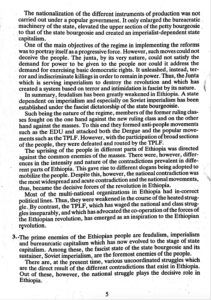
Extracts from “Briefing Sheet for Visitors To Tigray”
5’25” | atmos and birdsong outside Adi Daro church April 2019

Adi Daro church
7’05” | atmos and birdsong, Lalibela April 2019
7’40” | electronic “between song noodling” Informal welcome concert Kasa 20.1.98 on the evening of our first day at Greza music school
8’30” | Kasa valley stream and atmos with distant voices April 2019

Kasa valley 2019
10’00”| interview with Woyanit (my ex-clarinet student) translated by Asmelash and recorded during morning stop at a busy village sewa bar (extract)
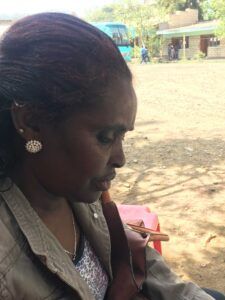
Woyanit in police yard Mekelle 2019
12’10” | singing and dancing by Kumana members of the cultural troupes recorded Kasa 28.1.87
13’50″ | play from cultural troupes performance at March 8th school recorded 9. 2.87 Many of these mini- dramas were to be educational agitprop.
15’00” | song from cultural troupes performance at March Eight (women fighters school) graduation ceremony school recorded 9. 2.87
15’55” | Mulu Tedesse playing kraar casually in Mekelle police yard. Mulu, a young guitarist in 1987 is now is the commander of the Tigray police band.
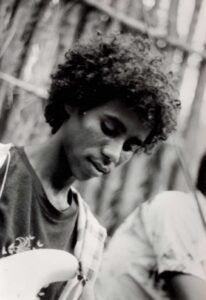
Mulu 1987
18’50” | Iyassu Berhe singing and playing kraar 1987
19’55” | Roland SH101 envelope filter from accessed 20.7.20
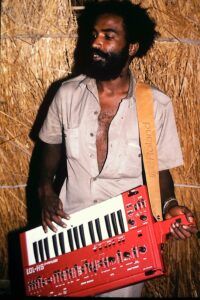
Iyassu Berhe SH101
20’40” | Roland Jupiter 6 demo from syntezatory.net.pl accessed 20.7.20

Cathy- Roland lesson planning inside hut
22’00” | Egyptian Reggae Jonathan Richman and the Modern Lovers (extract)
22’25” | None Shall escape the Judgement Earl Zero (extract)
24’35” | first workshop Feb 1987 (extract)
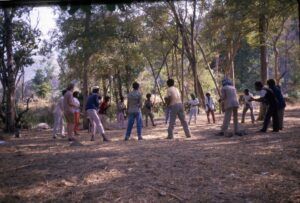
Workshop in progress
25’30” | women’s discussion tape 1987 consisting of interviews of various women fighters in the cultural troupes. Iyassu Berhe is translating (extract)

Women’s band Woyanit, Letish, Dehab, Atsede
26’30” | ‘Zeynidiybo Gobo’ – National Anthem of Tigray from cultural troupes performance at March Eight (women fighters school) graduation ceremony school recorded 9. 2.87
Iyassu Berhe singing ‘Zeynidiybo Gobo’
27’35” | ‘Woyanit, Kundahefti and Awetash, sing ‘Zeynidiybo Gobo’ in Sheraro in 2019 12.4.2019
28’55” | ‘singing and dancing by Kumana members of the cultural troupes recorded Kasa 28.1.87
29’55” | ‘first workshop Feb 1987 (extract)
31”00” | ‘inside police band concert

With police band Mekelle, Tigray April 2019
32’04 | ‘Terteraw leads us in a do re mi Kodaly sol-fah at inside police band concert
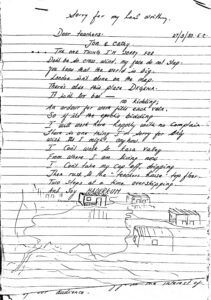
First page letter from Iyassu 27.3.80

Arranging class

Electric band

Iyassu acoustic miked guitar and casio
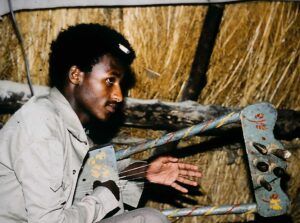
Kraar player

Kunama villagers

Lejalem, Atsede and Lumlum portastudio practice

PA and recording class
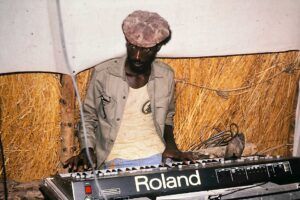
Playing Roland synth

Portastudio class

Village Baito meeting